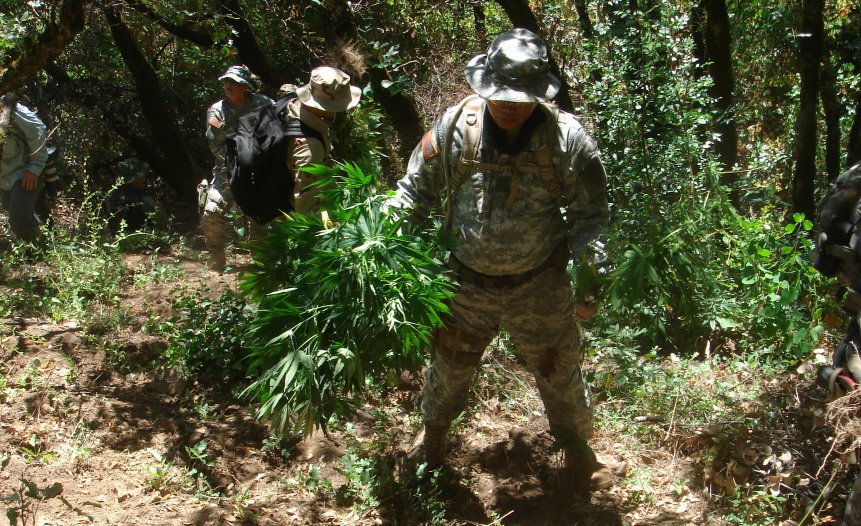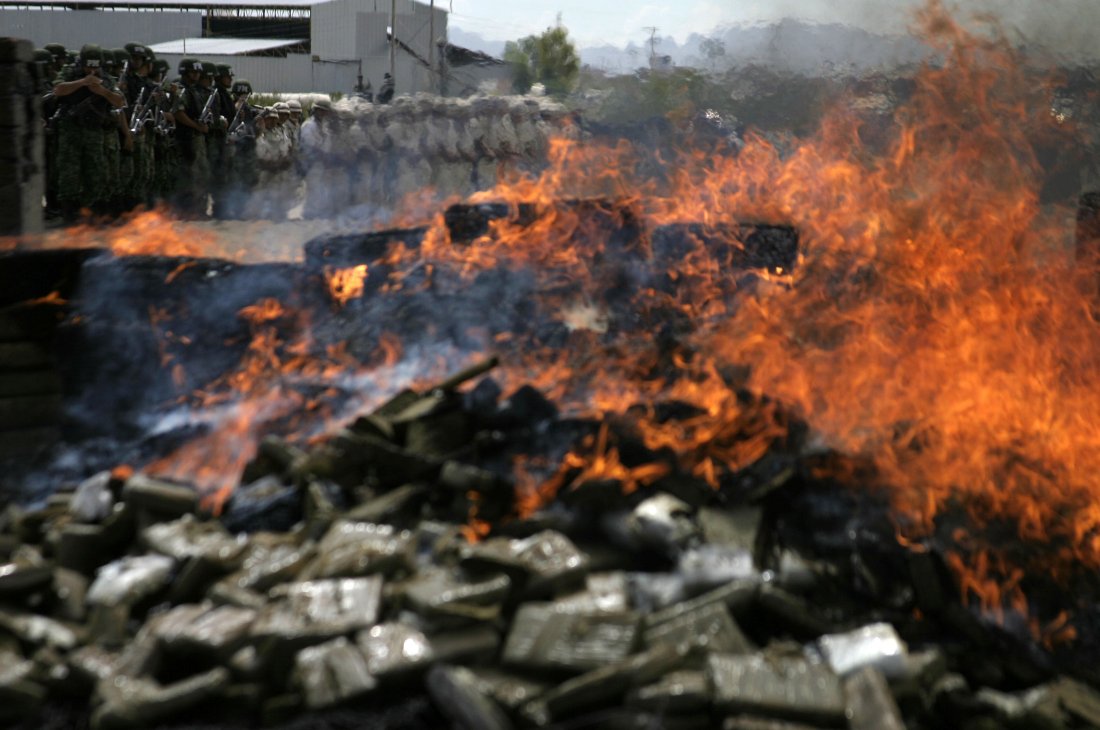TOOLS FOR DEBATE COVER and CONTENTS
| Reports - Tools for Debate |
Drug Abuse

Cover: Operation Alesia. US Forest Service work with Shasta County Sheriff’s Office and other partners to eradicate illegal marijuana grow sites in Shasta-Trinity National Forest, California. July 13, 2007. (Photo courtesy USFS Region 5)
Tools for Debate
US Federal Government Data on Cannabis Prohibition
A report of the International Centre for Science in Drug Policy, October 2010
Writing Committee
Evan Wood, MD, PhD; Dan Werb, MSc; Benedikt Fischer, PhD; Carl Hart, PhD; Alex Wodak, MD; Francisco Inacio Bastos, MD, PhD; Julio Montaner, MD; Thomas Kerr, PhD
About the International Centre for Science in Drug Policy
The International Centre for Science in Drug Policy (ICSDP) is an international volunteer network of scientists and academic physicians committed to improving the health of communities and individuals affected by illicit drugs. The network consists of leading public health and drug policy experts from around the globe who have come together in an effort to reduce drug-related harms by informing international drug policies with the best available scientific evidence. The ICSDP seeks to meaningfully reduce the harms of drugs by working collaboratively with communities, policy makers, law enforcement organizations and other stakeholders to guide effective and evidence-based policy responses to the many problems associated with the use of illegal drugs. The primary objective of the ICSDP is to conduct and disseminate original scientific research, including systematic reviews and evidence-based drug policy guidelines.
ICSDP Scientific Board
Chris Beyrer, MD, MPH
Professor and Director, Center for Public Health and Human Rights, Johns Hopkins Bloomberg School of Public Health, Baltimore, USA
Don C. Des Jarlais, PhD
Professor of Epidemiology, Department of Epidemiology and Population Health, Albert Einstein College of Medicine, New York, USA
Gordon Guyatt, MD, MSc, FRCPC
Professor, Department of Clinical Epidemiology & Biostatistics, McMaster University, Hamilton, Canada
Catherine Hankins, MD, MSc, FRCPC
Chief Scientific Advisor, Joint United Nations Programme on HIV/AIDS, Geneva, Switzerland
Carl L. Hart, PhD
Associate Professor, Clinical Neuroscience, Department of Psychiatry, Columbia University, New York, USA
Richard Horton, BSc, MB, FRCP, FMedSci
Editor-in-Chief, The Lancet, London, United Kingdom
Michel D. Kazatchkine, MD
Executive Director, The Global Fund to Fight AIDS, TB and Malaria, Geneva, Switzerland
Julio Montaner, MD, FRCPC
Professor of Medicine, Chair in AIDS Research, University of British Columbia, Vancouver, Canada
David J. Nutt, DM FRCP FRCPsych FMedSci
Edmond J. Safra Chair in Neuropsychopharmacology, Imperial College of London, United Kingdom
Steffanie A. Strathdee, PhD
Professor and Chief, Division of Global Public Health, University of California San Diego School of Medicine, USA
Evan Wood, MD, PhD
Clinical Associate Professor of Medicine, Division of AIDS, University of British Columbia, Vancouver, Canada
(International scientist members of the ICSDP who have endorsed this report are listed here)
International Centre for Science in Drug Policy
608 – 1081 Burrard Street, Vancouver BC
This e-mail address is being protected from spambots. You need JavaScript enabled to view it
Copyright © 2010
CONTENTS
Executive Summary
Introduction
Prohibition Funding, Cannabis Seizures and Arrests
Cannabis Price, Potency, Use and Availability
Unintended Consequences of Cannabis Prohibition
Drug Policies’ Relation to Rates of Cannabis Use
Limitations
Summary
Acknowledgements
References
All images used with permission.
“Alcohol and tobacco are far more dangerous drugs than cannabis, but no one is being killed in an alcohol or cigarette black market because those drugs are legal, regulated and taxed.”
Joseph D. McNamaraRetired Chief of Police for San Jose, California

Soldiers stand in formation as a pile of marijuana is incinerated at a military base in the border city of Ciudad Juarez September 9, 2009. More than a ton of narcotics, including marijuana, various illegal pills and cocaine, were incinerated as part of the Chihuahua joint operation, in which the federal government sent thousands of soldiers to curb drug violence in Mexico’s bloodiest city on the US border. (Reuters/Alejandro Bringas)
| Next > |
|---|












